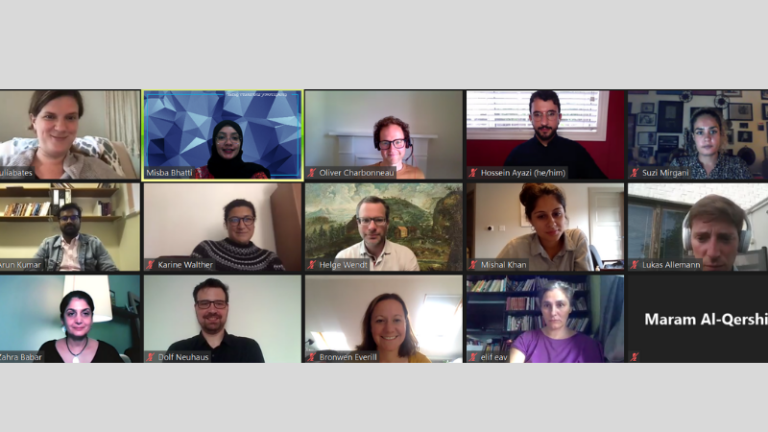American Studies, CIRS Faculty Research Workshops, Race & Society, Regional Studies
The Gospel of Work and Money: Global Histories of Industrial Education Virtual Working Group V

The Center for International and Regional Studies (CIRS) convened the fifth virtual workshop under its research initiative, The Gospel of Work and Money: Global Histories of Industrial Education, on July 13, 2021. During this workshop, three project contributors presented their draft papers and received in-depth feedback from the group.
The group discussion was initiation by Dolf-Alexander Neuhaus, who presented his article titled, “Industrial Education in Korea from the 1880s to the 1930s.” The chapter looks at the evolution of industrial education in Korea while it was under Japanese colonial rule. The author argues that during this period a multilayered education system existed in Korea. The industrial education model was built by the missionaries and the YMCA, to instill Koreans with a Protestant work ethic and teach them about industrial labor and capitalism. However, many of the Korean nationalist leaders who had converted to Christianity, saw industrialization as a requirement to attain “civilization and enlightenment” or “self-strengthening.” Using a variety of sources, such as the writings of Korean educators, missionary reports as well as official colonial documents, Neuhaus aims to explore how the missionary efforts for industrial education and colonial education policy are interconnected. The chapter will examine the industrial education policies set up by the Japanese colonial government, as well as look at the private learning facilities set up by the YMCA in Korea during the early decades of the 20th century.
Lukas Alleman’s chapter titled “Boarding School Education in the Soviet Arctic – Rationalizing and Industrializing Away Indigenous Livelihoods,” examines the Soviet Union’s industrial educational efforts targeting indigenous Arctic communities. The author suggests that there are ideological commonalities between modern ‘Western’ nations and the Soviet State when it comes to the treatment of indigenous communities, and their assimilation and integration via educational systems. The paper draws on ethnographic material to provide an empirically-based account of the Sámi, in the Kola Peninsula, who in multiple ways were impacted by different forms of state efforts to mainstream them into Soviet economic life. These development policies among others included intensified boarding schooling of the indigenous children which almost never played out as originally intended and contributed to urbanizing indigenous livelihoods and dissolving family structures.
Hossein Ayazi presented the last paper titled, “Plantation Pedagogies, Counterrevolutionary Geographies: Agricultural Development, Industrial Education, and Firestone Natural Rubber Co.” The chapter looks at the changing nature of U.S.-Liberia relations and the work of Firestone Natural Rubber Company within the independent West African republic in order to trace the specific social processes of reproduction that helped restage colonial possession, plantation dispossession, and differentially racialized devaluation toward the emerging terms of international finance and development under U.S. leadership. Using Booker Washington Agricultural and Industrial Institute (BWI), which was founded in 1929 in Kakata, Liberia, as a case study, the author details United States’ agricultural education and manual training efforts within Liberia and argues that by the mid-20th century, the “gospel of work and money” professed by U.S. business leaders, state officials, reformers, social scientists and others became the gospel of national independence, economic internationalism, and bureaucratic rationality, thus containing the convergent anti-colonial and anti-capitalist insurgences that characterized the agrarian periphery of the U.S. and European empires across the first half of the 20th century.
The last paper workshop for the project will be held in Fall 2021.
- For the meeting agenda, click here.
- For the participants’ biographies, click here.
- For the research initiative, click here.
Participants and Discussants:
- Elif Ekin Akşit, Ankara University, Turkey
- Maram Al-Qershi, CIRS – Georgetown University in Qatar
- Lukas Alleman, University of Lapland
- Hossein Ayazi, Williams College
- Zahra Babar, CIRS – Georgetown University in Qatar
- Julia Bates, Sacred Heart University
- Misba Bhatti, CIRS – Georgetown University in Qatar
- Oliver Charbonneau, University of Glasgow
- Bronwen Everill, University of Cambridge
- Mishal Khan, The University of Texas Austin
- Arun Kumar, University of Nottingham
- Suzi Mirgani, CIRS – Georgetown University in Qatar
- Dolf-Alexander Neuhaus, Free Berlin University
- Karine Walther, Georgetown University in Qatar
- Helge Wendt, Max Planck Institute for the History of Science (MPIWG) Berlin
Article by Misba Bhatti, Research Analyst at CIRS